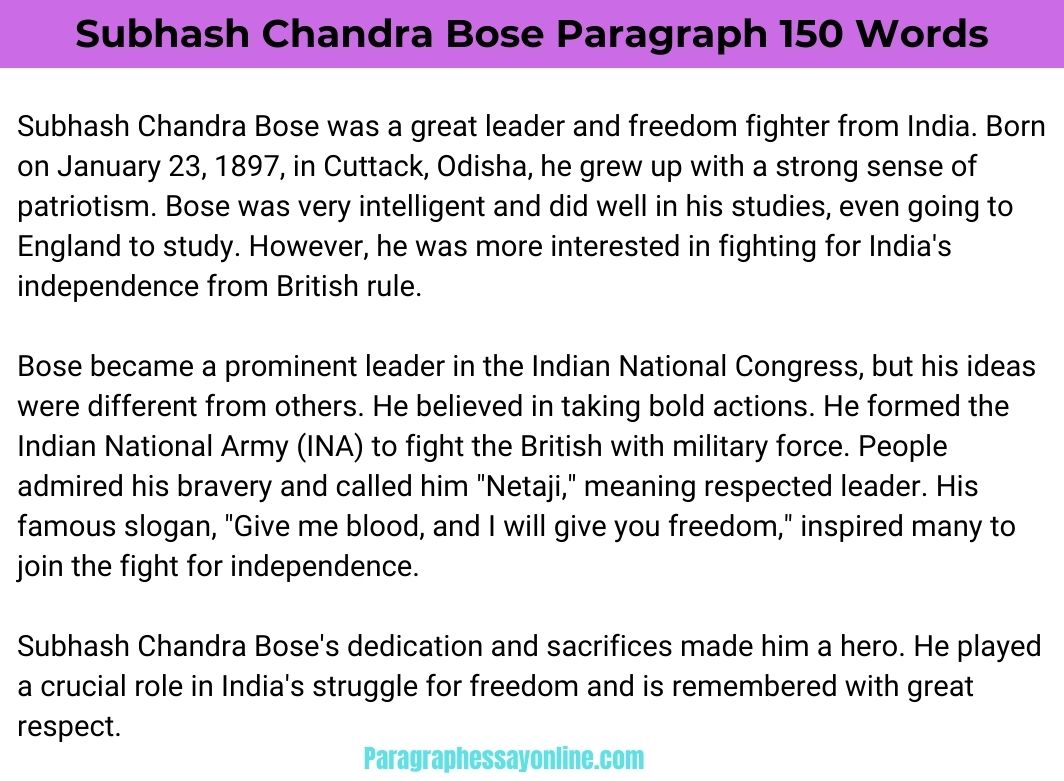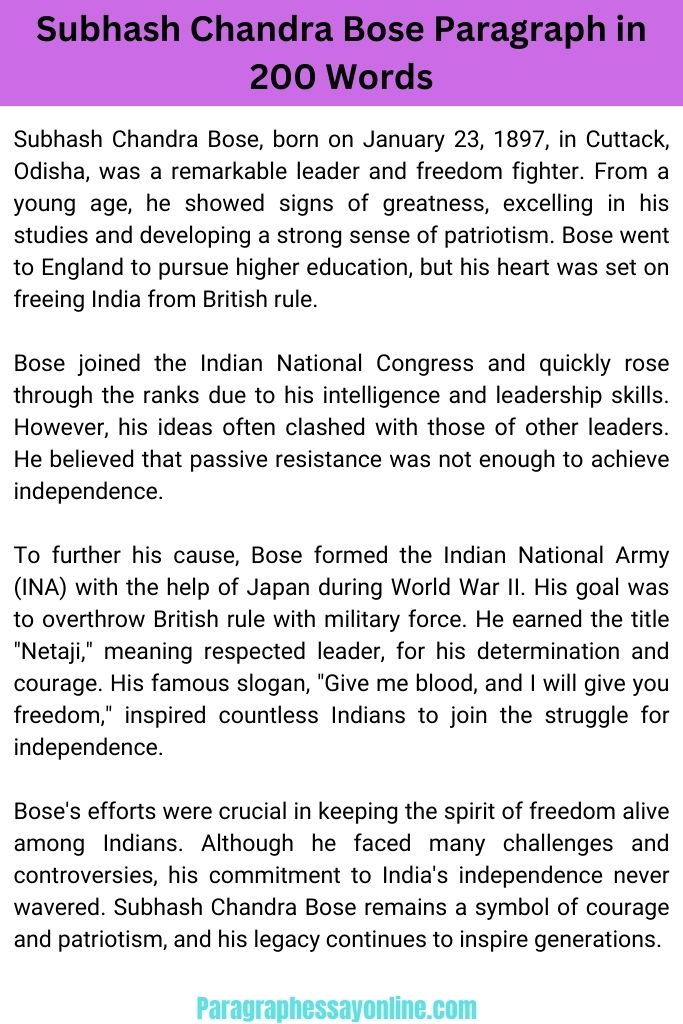Subhash Chandra Bose Paragraph
Subhash Chandra Bose Paragraph For Class 5, 6, 7, 8, 9 & 12
Subhash Chandra Bose, also known as Netaji, was a prominent Indian nationalist leader who played a crucial role in India’s struggle for independence. His unwavering patriotism, revolutionary tactics, and inspiring leadership continue to inspire generations of Indians to this day.
Paragraph On Subhash Chandra Bose 100 Words For 1, 2, 3 Students
Subhash Chandra Bose was a brave leader from India. He was born on January 23, 1897, in Cuttack, Odisha. Bose loved his country and wanted it to be free from British rule. He was known for his strong and fearless nature. He started the Indian National Army (INA) to fight against the British. People called him “Netaji,” which means respected leader.
Bose’s famous slogan was “Give me blood, and I will give you freedom.” He worked hard for India’s freedom and inspired many people. Subhash Chandra Bose is remembered as a hero in India’s struggle for independence.
Subhash Chandra Bose Paragraph in 150 Words For 4 & 5 Students
Subhash Chandra Bose was a great leader and freedom fighter from India. Born on January 23, 1897, in Cuttack, Odisha, he grew up with a strong sense of patriotism. Bose was very intelligent and did well in his studies, even going to England to study. However, he was more interested in fighting for India’s independence from British rule.

Bose became a prominent leader in the Indian National Congress, but his ideas were different from others. He believed in taking bold actions. He formed the Indian National Army (INA) to fight the British with military force. People admired his bravery and called him “Netaji,” meaning respected leader. His famous slogan, “Give me blood, and I will give you freedom,” inspired many to join the fight for independence.
Subhash Chandra Bose’s dedication and sacrifices made him a hero. He played a crucial role in India’s struggle for freedom and is remembered with great respect.
Subhash Chandra Bose Paragraph in 200 Words For 6, 7, and 8 Students
Subhash Chandra Bose, born on January 23, 1897, in Cuttack, Odisha, was a remarkable leader and freedom fighter. From a young age, he showed signs of greatness, excelling in his studies and developing a strong sense of patriotism. Bose went to England to pursue higher education, but his heart was set on freeing India from British rule.
Bose joined the Indian National Congress and quickly rose through the ranks due to his intelligence and leadership skills. However, his ideas often clashed with those of other leaders. He believed that passive resistance was not enough to achieve independence.
To further his cause, Bose formed the Indian National Army (INA) with the help of Japan during World War II. His goal was to overthrow British rule with military force. He earned the title “Netaji,” meaning respected leader, for his determination and courage. His famous slogan, “Give me blood, and I will give you freedom,” inspired countless Indians to join the struggle for independence.
Bose’s efforts were crucial in keeping the spirit of freedom alive among Indians. Although he faced many challenges and controversies, his commitment to India’s independence never wavered. Subhash Chandra Bose remains a symbol of courage and patriotism, and his legacy continues to inspire generations.

Paragraph On Subhash Chandra Bose in 250 Words For 8,9,10 Students
Subhash Chandra Bose, born on January 23, 1897, in Cuttack, Odisha, was a key figure in India’s struggle for independence. From a young age, he demonstrated exceptional intellect and a deep sense of patriotism. After completing his education in India, he went to England to prepare for the Indian Civil Services (ICS). However, his desire to fight for India’s freedom led him to resign from the ICS and join the Indian National Congress.
Bose quickly became a prominent leader within the Congress due to his bold ideas and leadership skills. He often disagreed with other leaders, like Mahatma Gandhi, who advocated for non-violent resistance. Bose believed that India needed to take stronger, more direct action against British rule. His determination led him to form the Indian National Army (INA) during World War II, with support from Japan. The INA aimed to liberate India through military means.
Bose’s leadership and charisma earned him the title “Netaji,” meaning respected leader. His rallying cry, “Give me blood, and I will give you freedom,” became a powerful symbol of resistance. Despite facing numerous obstacles, including imprisonment and exile, Bose remained steadfast in his mission.
His efforts significantly contributed to the momentum of India’s independence movement. While his methods were controversial, his dedication to the cause was undeniable. Bose’s mysterious disappearance in 1945 added to his legendary status. To this day, Subhash Chandra Bose is remembered as a hero who sacrificed everything for his country’s freedom. His legacy continues to inspire new generations to value and fight for their nation’s independence and dignity.
Subhash Chandra Bose Paragraph 300 Words For 9, 10, 11, 12 Students
Subhash Chandra Bose, born on January 23, 1897, in Cuttack, Odisha, stands as a towering figure in India’s quest for independence from British colonial rule. His early years were marked by academic excellence and a burgeoning sense of nationalism. After his initial education in India, he traveled to England to prepare for the Indian Civil Services (ICS). Despite succeeding, he chose to resign from the ICS, driven by a profound desire to dedicate himself to India’s freedom struggle.
Bose’s political journey began with the Indian National Congress, where his dynamic leadership and revolutionary ideas quickly set him apart. Unlike many of his contemporaries, including Mahatma Gandhi, who championed non-violent resistance, Bose believed that a more aggressive stance was necessary to expel the British. This ideological rift led him to pursue a different path, emphasizing the need for armed struggle.
During World War II, Bose sought international support to liberate India, forming the Indian National Army (INA) with the assistance of Japan. The INA was composed of Indian prisoners of war and expatriates, united by the goal of freeing their homeland. Bose’s leadership, marked by his impassioned speeches and unwavering resolve, earned him the honorific “Netaji,” meaning respected leader. His famous declaration, “Give me blood, and I will give you freedom,” became a rallying cry for many Indians.
Bose’s strategies and the INA’s campaigns, although ultimately unsuccessful in a military sense, played a crucial role in galvanizing Indian public opinion against British rule. His efforts highlighted the intensity of the Indian desire for independence and demonstrated that the British could no longer maintain control without facing significant resistance.
The mystery surrounding Bose’s disappearance in 1945 has only added to his mystique and enduring legacy. His life and work remain a source of inspiration, embodying the spirit of sacrifice, resilience, and unwavering commitment to the nation’s sovereignty. Subhash Chandra Bose’s legacy continues to inspire generations, reminding them of the relentless pursuit of freedom and justice.
Subhash Chandra Bose Paragraph in 500 Words For 9, 10, 11, and 12 Students
Subhash Chandra Bose, born on January 23, 1897, in Cuttack, Odisha, is remembered as one of the most dynamic and charismatic leaders of India’s freedom struggle. His early years were marked by academic brilliance and a fervent sense of nationalism. Bose completed his schooling in Cuttack and then attended Presidency College in Calcutta (now Kolkata). His strong opposition to British rule became evident early on when he was expelled from the college for his involvement in nationalist activities.
After completing his education in India, Bose traveled to England to prepare for the Indian Civil Services (ICS) examination, which he passed with distinction. However, his calling lay elsewhere. Dissatisfied with the prospect of serving the British government, Bose resigned from the ICS and returned to India in 1921 to join the Indian National Congress and actively participate in the independence movement.
Bose quickly rose through the ranks of the Congress due to his intellect, leadership skills, and unwavering dedication to the cause of independence. However, his radical ideas often put him at odds with other prominent leaders, particularly Mahatma Gandhi.
In 1938, Bose was elected President of the Indian National Congress but resigned a year later due to his ongoing conflicts with the more conservative elements within the party. Undeterred, Bose continued to seek ways to secure India’s freedom.
Bose’s journey took him to Germany, where he sought assistance from Adolf Hitler. However, realizing the limitations of German support, he made a daring submarine journey to Japan in 1943. In Japan, he reorganized the Indian National Army (INA), initially founded by Mohan Singh and others, and took over its leadership. The INA, composed of Indian prisoners of war and expatriates in Southeast Asia, aimed to overthrow British rule through military action.
Under Bose’s leadership, the INA adopted the slogan “Chalo Delhi” (On to Delhi) and launched several campaigns against British forces in India. Bose’s stirring speeches and relentless energy galvanized the troops and inspired many Indians to join the fight for freedom. His famous declaration, “Give me blood, and I will give you freedom,” became a rallying cry for millions.
Despite the INA’s initial successes, the tide of World War II eventually turned against the Axis powers, and the INA faced significant setbacks. The British forces, with superior resources and military strength, managed to quell the INA’s efforts. Bose’s leadership, however, had left an indelible mark on the Indian psyche, demonstrating the lengths to which Indians were willing to go to achieve independence.
The circumstances of Subhash Chandra Bose’s death remain shrouded in mystery. He is believed to have died in a plane crash in Taiwan on August 18, 1945, but conspiracy theories and doubts about his fate persist to this day. Regardless of the unanswered questions surrounding his death, Bose’s legacy as a fearless patriot and a relentless advocate for India’s freedom remains intact.
Subhash Chandra Bose’s life and work continue to inspire generations of Indians. His dedication to the cause of independence, his willingness to challenge established norms, and his ability to rally people to his vision of a free India make him a towering figure in the history of India’s freedom struggle. His legacy is a testament to the power of courage, determination, and unwavering commitment to one’s ideals.
Most Important Paragraph:
| Active And Passive Voice Paragraph. |
| Paragraph On Sustainable Development. |
| Importance Of Time Paragraph. |
| Self Help Is The Best Help Paragraph. |
| Importance Of Punctuality In Students Life Paragraph. |
Frequently Asked Questions Paragraph On Subhash Chandra Bose
Q: What was Bose’s role in the Indian independence movement?
Bose was a prominent figure in the Indian independence movement, known for his revolutionary nationalism and socialist principles. He formed the Indian National Army (INA) to fight against the British.
Q: What was Bose’s famous slogan?
Bose’s famous slogan was “Tum Mujhe Khoon Do, Main Tumhe Aazadi Dunga” (You give me blood, I will give you freedom).
Q: How many times was Bose imprisoned by the British?
Bose was imprisoned 11 times during his struggle for independence.
Q: What happened to Bose in 1945?
In August 1945, Bose died in a plane crash in Japanese-ruled Formosa (now Taiwan) while fleeing from the Japanese. However, many of his supporters refused to believe the circumstances of his death.
Q: Who was Bose’s political guru?
Chittaranjan Das, a prominent Bengali politician, became Bose’s political guru and influenced his nationalist views.
